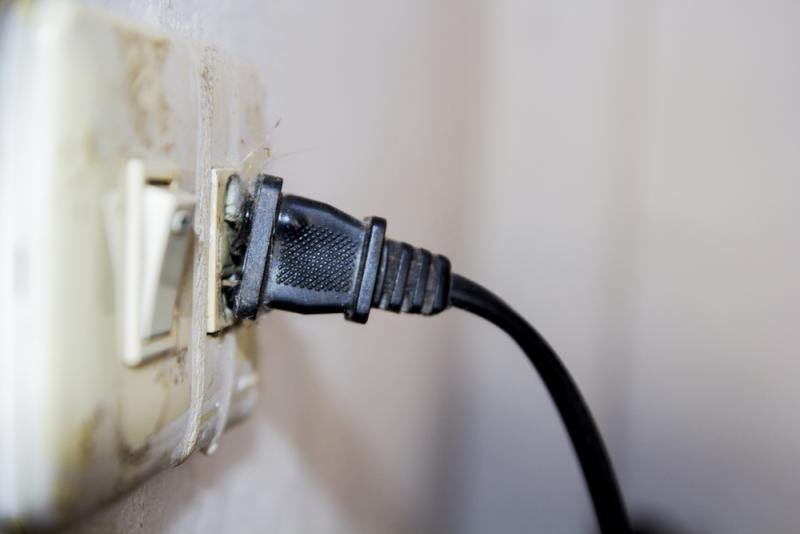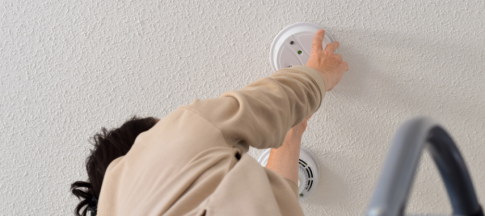
A house fire can be a frightening and dangerous experience. We’ve put together this guide to help you prevent and cope with a fire – and explain what to do after a house fire from an insurance perspective.
Smoke alarms
A smoke alarm could save your life. Every home should have at least one smoke alarm on each floor, and every alarm should be tested at least once a month.
Standard battery-operated alarms need the batteries changed once a year.
Your local fire and rescue service will be happy to give you advice on which alarm is best suited for you.
Place each smoke alarm close to a potential source of fire. Statistically, more fires start in the kitchen than anywhere else but to avoid sensitivity to everyday occurrences like burning toast, place the alarm just outside the kitchen.
It's easier for fire to take hold where there's a lot of combustible material such as carpets, curtains, bedding, and clothes. Have a smoke alarm close to the bedrooms (such as on a landing), and in the living room.
From 1 February 2022, all homes in Scotland will be required by law to install smoke alarms which means they will need to have:
- one smoke alarm in the most commonly used room
- one smoke alarm in any ‘circulation’ space (such as hallway or landing)
- one heat alarm in the kitchen
All alarms must be mounted on the ceiling and interlinked which means that if one alarm goes off, they all go off.
Any homes with carbon-fuelled appliances, such as a boiler or heater, must also have a carbon monoxide detector installed.
Fire safety in the kitchen
According to the Fire Service, around half of home fires are caused by cooking accidents. To stay safe, you should:
- keep the oven and hob clean - don't let food and fat build up on the oven, hob or grill as you risk them burning and causing a fire
- not leave children in the kitchen alone - turn saucepan handles towards the hob so children can't grab them
- be careful with loose clothing - wear short sleeves or roll them up
- not leave oven gloves or tea towels hanging near the hob - as these can set fire easily
- be careful when deep fat frying as hot cooking oil sets alight easily - if oil smokes, turn off the heat and leave it to cool
- buy a fire blanket for your kitchen - these are affordable to buy and could make a huge difference
If a pan catches fire, don't take any risks – turn off the heat and, if safe to do so, cover with a fire blanket. Never throw water over it and don't try to tackle the fire yourself. Get to safety and call 999.
Fire safety around your home
These are our general tips for fire safety in your home:
- don't overload sockets - high-powered appliances like washing machines and tumble dryers should have their own socket
- clear your washing machine and tumble dryer filters regularly - this is to prevent build-up of fabric deposits, and don't leave them on overnight
- turn off electrical devices that aren't in use - especially ones that give off heat like hair straighteners and phone chargers
- don't leave electric blankets switched on while you're out of the house - either store them flat or rolled up as folding can damage the internal wiring (you should also regularly check them for wear and tear)
- keep portable heaters upright and secured against a wall and on a flat surface - also keep them away from curtains and furniture, and don't dry clothes on them
- make sure your furniture has a fire-resistant label - this shows it meets the legal fire safety standards
- if you have an open fireplace, make sure the chimney is swept regularly and use a fireguard - and keep matches out of the reach of children
- if you smoke, make sure cigarettes are stubbed out properly in an ashtray - never stub them in a wastepaper basket and don't smoke in bed
- be careful with candles - keep them away from curtains and other upholstery, and put them out if you leave the room and before bed
Be prepared for a fire
Check your home insurance policy schedule for precautions you must take. For example, you may need to install fire extinguishers if you live in a thatched-roof property.
Plan an escape route for you and anyone else in the house - arrange a meeting point, whether in the street or in the garden.
Keep all doorways keep exits clear of obstacles in case you need to escape quickly.
What to do during a house fire
If there is a small fire in your home, it may be possible to extinguish it by starving it of oxygen with a fire blanket.
Do not attempt to tackle a large fire yourself. Instead, you should:
- raise the alarm straight away and call the emergency services
- evacuate as quickly as possible
- stay as low as possible if there is a lot of smoke rising
- place a wet towel over your mouth, which acts as a filter to help you breathe more easily
- if you’re not on the ground floor, first try escaping down the stairwell – don’t use any lifts
- tell neighbours if you think their property may also be affected especially if the fire spreads to the loft space, or you have people living above you
Renters living on the first or second floor can ask their landlord for a set of foldable steps that can be used to escape from a window.
What if my house has asbestos?
During a house fire, pieces of asbestos and some fibres may remain in the ash and present a risk if they are disturbed.
If you suspect that asbestos-containing materials have been burnt at your property, don’t attempt to clean the ashes up.
Instead, speak to your insurer who will advise the best course of action.
Claiming on your home insurance after a house fire
A house fire is an extremely traumatic event, and damage to your home is likely to be significant – including damage from water used to extinguish the flames.
If your home's damaged by a fire, contact your insurer as soon as possible once you are safe.
Depending on if you're a renter, homeowner or landlord, you'll either be covered by buildings insurance, contents insurance, or combined home insurance.
Dealing with the aftermath of a fire:
After a fire, you should:
- ventilate the property by opening windows and doors, where safe to do so, to allow fresh air to circulate
- not use the gas or electricity until they’ve been checked by a professional
- not throw away anything until a full inventory of damaged items has been taken
- take photographs of the damage if possible
- remove food from fridges and freezers and list all items if the electricity is off
- leave cleaning to professionals unless the smoke damage is very localised - your insurer may get a restoration company to handle the clean up
- vacate the premises if the damage is extensive and there's any damage of collapse, or health risks
Your home will be assessed by the fire service to see if it’s structurally sound. If it is, we may assign a loss adjuster to assess the cost of repairs, and begin the process of rebuilding.
If not, your home may be condemned and require demolition. It will either be rebuilt or you might get a cash payout equivalent to the amount it has decreased in value.
You’ll also be able to make a claim for replacement of any items damaged by fire or smoke on your contents insurance.
If your home is consider uninhabitable while repairs are being completed, we'll pay a reasonable cost of temporary alternative for you and whoever lives in your home, including your pets.


